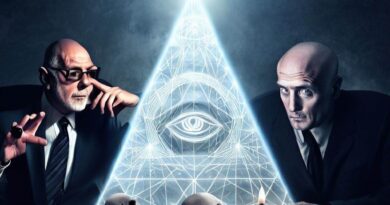OPINION: Who Believes in the ‘Deep State?’

The idea of a “deep state” is relatively a new phenomenon, emerging from a specific historical context. Its wider application has come at the price of developing a consistent criterion for what constitutes a “deep” state, as opposed to a modern administrative state with a robust civil service. Introduced into the American political lexicon in the mid-2000s, deep state has become the preferred epithet of the far right and left in American discourse, a disturbing trend in the continuing ideological polarization affecting American politics.
Conceptually, deep state originated in the collapse of the Ottoman Empire in the aftermath of WWI, and the subsequent rise of modern Turkey. Determined to forge a modern, secular nation-state, Turkey’s first leader, Kemal Mustafa Atatürk launched a thoroughgoing program of “Turkification,” or the forced adoption of Turkish language and culture, on ethnic minorities remaining within the Turkish state. The central pillars of this ideology was the enforced secularism of the Turkish state, combined with a highly centralized state that was nevertheless anti-communist and oriented toward Western Europe.
The evolution of the Turkish state, replete with military coups and clandestine violence against ethnic minorities, presented an image to the outside world of a fledgling state slowly evolving into a modern democracy. Below the surface, powerful unelected and unaccountable members of the military and intelligence communities acted to protect the state’s image, often employing organized criminal elements to do its dirty work.
Once introduced as a term of art in academic circles, the term quickly became a popular adjective to describe nations similarly dogged by over-active military and intelligence communities, particularly in Latin America, the Middle East, and Southeast Asia.
The insinuation that America had a “deep state problem” came emerged from the academic left, where the deep state represented those elements of government captures by powerful financial interests, supporting the outsourcing of American jobs, privatization of public resources, deregulation, and grants of disproportionate influence to financial institutions influence over the government’s fiscal and monetary policy.
Conservative supporters of Donald Trump have subsequently appropriated the term for their own ends, accusing executive branch holdovers from the Obama and earlier Democratic administration an attempted coup. From this perspective, whistleblowers are not nonpartisan public servants seeking to publicize illegal or unethical activities, but partisan ideologues driven by “Trump Derangement Syndrome” to manipulate the law to bring down a democratically elected president.
Obviously, a person’s ideological convictions will influence which conspiracy is most compelling. The problem is how notions like the deep state, once insinuated in American discourse, influence the way Americans think about politics. As more and more Americans edge further out toward ideological extremes, conspiracy theories take on greater resonance.
The recent Senate Intelligence Committee hearings offer an illustration of weaponizing allegations of deep state machinations. During questioning of former Deputy Attorney General Rod Rosenstein, Republican senators accused members of the FBI of pursuing investigations into the Trump campaign as engaged in partisan investigations designed to undermine the prospects of Donald Trump’s election, and – having failed – to erode the legitimacy of a duly elected president. Senate Republicans particularly highlighted the cell phone texts of senior FBI agents Peter Stzrok and Lisa Page, whose denigration of candidate Trump Republicans claimed as evidence of a biased investigation. The hearings also highlighted mistakes made by the FBI in seeking Foreign Intelligence Surveillance Act, warrants on Trump campaign operatives that were legitimate abuses of FBI investigative authority, and justifiably draw attention to the need for reforms to the FISA process.
That the FBI is temperamentally, culturally, and politically the most conservative agency in the executive branch was beside the point of the exercise, as was the fact that neither Stzrok nor Page acted in a decision-making capacity. Texas Senator Ted Cruz’s allegation that “What the Obama-Biden administration did in 2016-2017 makes everything Richard Nixon even contemplated pale in comparison” demonstrates how notions of a conspiratorial deep state can be weaponized to serve partisan ends.
The ease with which the idea can slip from one end of the ideological spectrum to the other is testimony both to its potency and its vacuity. What are the key elements of a deep state that differentiate it from the kind of administrative state existing in virtually every modern, industrialized or post-industrial nation-state? Professor at the Naval Postgraduate School and Turkey expert Ryan Gingeras notes, it “is one thing to argue that bureaucracies can resist change or believe that private citizens or groups can quietly influence policymakers. It is yet another to assume that such interests form distinct collectives that can transcend decades or generations without evolving or breaking down.”
One of the seminal features of an effectively functioning civil service implementation of public policies is the establishment and maintenance of strong bureaucratic cultures committed to what we political scientists describe as “norms of objectivity.” Operating within such a culture, civil servants are indifferent to partisanship, but rather focus on the administration of policies. An important caveat is the commitment within the civil service to act within the constraints of the law. Acting on suspicion of a deep state obliterates any notion of bureaucratic neutrality. Assuming zero-sum logic, factions motivated by deep state logic can only view executive branch agencies as collaborators or rebels.
The question is not whether or not a powerful administrative state exists. Clearly, it does. Americans of all persuasions should be alert to potential threats their personal liberties. The question is whether the deep state is an autonomous agent bent on subverting democracy, or an instrument in the subversion of democracy.
The further left, or right, a person’s beliefs, the more congenial are such ideas as a conspiratorial deep state. For those who belief in the existence of a deep state the proposition that their domestic opponents can be trusted with political power become increasingly dubious. When domestic rivals become “enemies to democracy,” the commitment to truth and democratic governance are among its first casualties.
Dr. Ken Hicks is a political scientist and department head of History and Political Science at Rogers State University. The opinions, beliefs, and viewpoints expressed in this column are those of the author, and do not necessarily reflect the official position of RSU.


